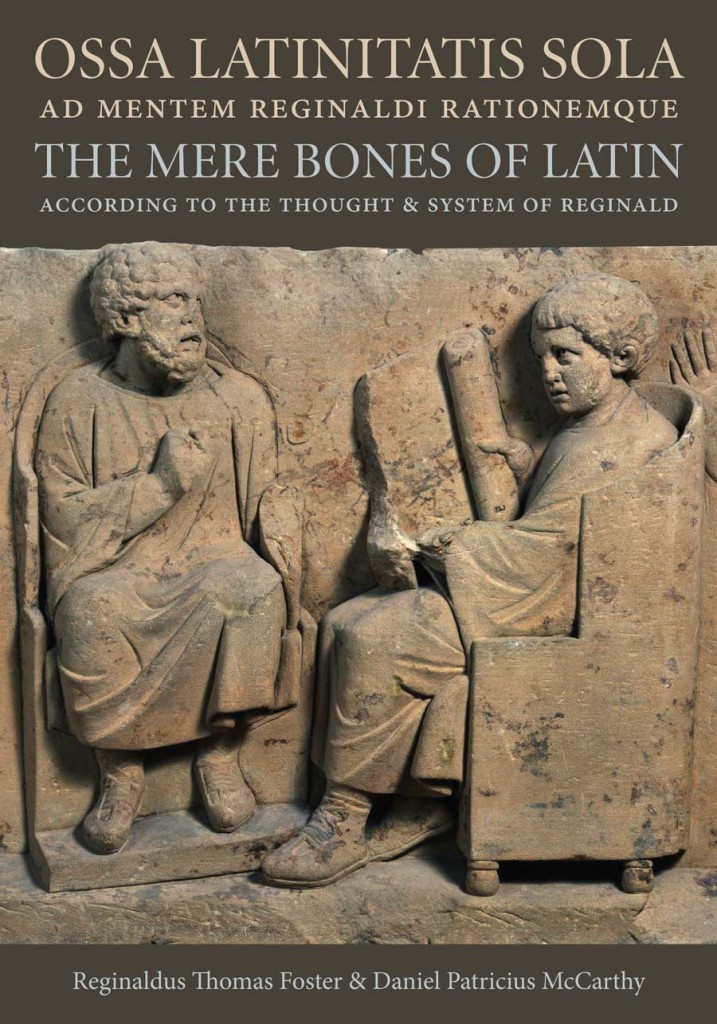PONTIFICIUM ATHENÆUM S. ANSELMI DE URBE
PONTIFICIUM INSTITUTUM LITURGICUM
PIL course number: yet to be assigned
Instructor: Daniel McCarthy
Brief description
Students develop their appreciation of the Latin language through reading and understanding texts especially from seven areas of ecclesial literature pertaining to the study of liturgy: biblica, patristica, liturgica, scholastica, magisteria, musica, canonica. They will develop a more comprehensive understanding of ideas expressed in Latin and greater ease and precision in expressing them in both Latin and English.
Objectives
At the end of this course the participants will have
1. read and understood Latin liturgical texts from seven areas: biblica, patristica, liturgica, scholastica, magisteria, musica, canonica.
2. developed a more comprehensive understanding of the structure of the Latin language and its modes of expression,
3. gained greater ease and precision in expressing thoughts in both Latin and English,
4. sorted out more fully the ambiguities of each language and
5. be prepared to conduct their own research in several genres of Latin liturgical texts.
Schedule: every Monday of the academic year, from 10:15-11:50 AM.
learning activities
Preparation
Participants should already have a working understanding of the structure of the Latin language as presented in the volume R.T. Foster – D.P. McCarthy, Ossa Latinitatis Sola ad mentem reginaldi rationemque: The Mere Bones of Latin according to the thought and system of Reginald (link). Participants may be asked to review particular sections of that volume in preparation for their classroom encounters and to come with their questions.
Ludus domesticus = home game
For each encounter, participants will prepare and hand-in a weekly ludus domesticus, “home game”. Participants are to complete each ludus on one’s own, not working together with others, so that each person has to wrestle with one’s own understanding of the language until the concepts become clear. These ludi are not typical homework exercises, but really are “games” to lead us into the adventure of learning the Latin language. The instructor will review the ludi and return them for discussion during a subsequent encounter.
Half of our time together will be dedicated to reviewing the weekly ludus. Only as our consideration of the liturgical texts requires, shall we briefly review the structure of the Latin language from Ossa, but full presentations of this material should not be needed in this reading course.
Encounter
Over the course of the academic year we should have approximately 25 weekly encounters of an hour and a half each. We shall spend our time together reading and understanding Latin texts especially from seven areas of ecclesial literature pertaining to the study of liturgy: biblica, patristica, liturgica, scholastica, magisteria, musica, canonica. Participants will develop a more comprehensive understanding of ideas expressed in Latin and greater ease and precision in expressing them in both Latin and English.
Half of each weekly session will be devoted to the presentation given by one of the participants of a liturgical text such as a mass formulary of prayers or a hymn or sequence or a passage from the lectio altera of the office of readings. The presenter is excused from preparing the ludus that week. The other half of each session will be spent reviewing the ludus.
Participants studying a body of Latin liturgical literature from any of these seven areas for their tesina may offer to present the material during their classroom presentation.
Limits
As long as the time permits we shall continue reading Latin liturgical texts from many different authors and eras accompanied by additional ludi of the highest level. A knowledge of the structure of the Latin language is required and presumed and will be discussed only as our reading of Latin literature warrants a brief review.
General
This course is intended for people who have completed the course 101032 offered at the Pontifical Institute of Liturgy, or who have demonstrated proficiency not only in the Latin language but also in our method of studying the Latin language according to the system of Fr. Reginald Foster, OCD. In his system, this course is the equivalent of the Fifth Experience of continuous readings of Latin texts with our concentration on liturgical texts of several genres. As such, the course presumes an advanced knowledge of the Latin language and requires dedicated personal study and application.
This course is part of the Licentiate program in liturgy at the Pontifical Institute of Liturgy at Sant’Anselmo, Rome. This course is the English equivalent of the course taught in Italian at the PIL under the title: 94018 – Lettura di testi liturgici latini. Other qualified people are welcome to enrol and join our reading of Latin liturgical texts without enrolling in other courses in liturgy.
Assessment
This course has no final exam, only the regular study and practice of the Latin language. Valuation will be determined on a continuous basis. Participants are expected to participate in our weekly encounters and to complete and hand in the ludi regularly. The valuation mark indicates participation by attending our encounters, doing the ludi domestici and making presentations as time allows, rather than taking a proficiency exam at the end of our studies.
Assessment is determined by attendance, participation, presentation and completion of the ludi. Two or more non-excused absences or 2 ludi not completed and handed in during a semester will result in a lower mark at the end of the semester.
Participants from other institutes who take this course for credit will receive from the Pontificium Athenaeum Sancti Anselmi ECTS credits for their study of Latin, provided they satisfactorily complete the course requirements.
Obligatory Bibliography
- Each participant needs their own copy of the C.T. Lewis – C. Short, A Latin Dictionary, Oxford UP, Oxford – New York 1879, thereafter reprinted. A new and more affordable paper-back edition has been published by Nigel Gourlay, Chapel-en-le-Frith 2020.
- Participants are expected to have studied the 105 encounters from this volume: R.T. Foster – D.P. McCarthy, Ossa Latinitatis sola ad mentem Reginaldi rationemque: The Mere Bones of Latin according to the thought and system of Reginald (Latinitatis corpus 1), Catholic University of America Press, Washington DC 2016. Available in print from the publisher or from bookstores in Rome and in digital format directly from the publisher.
- Gildersleeve, B.L, – G. Lodge, Gildersleeve’s Latin Grammar, Bolchazy-Carducci, Wauconda IL 2003, reprint of 31895. This is the standard handbook we consult.
Recommended volumes
- Studies of individual prayers will teach literary analysis and hermeneutics as presented in: Appreciating the Collect: An Irenic Methodology, and Transition in the Easter Vigil: Becoming Christians. Paschali in vigilia Christiani nominis fieri, ed. J.G. Leachman – D.P. McCarthy (Documenta Rerum Ecclesiasticarum Instaurata, Liturgiam aestimare : Appreciating the Liturgy 1, 2), St. Michael’s Abbey Press, Farnborough, England 2008, 2011.
- A good philological and historical study of collects is: G. Moore, The Collects for Ordinary Time: A Study in the Roman Missal, from the same series and published in 2017.
- Participants are recommended to consult the volume: L. Pooley, Ossa Ostensa: A Proven system for demystifying Latin, The Catholic Education Press, Washington D.C. 2021. Available in print from the publisher or from bookstores in Rome and in digital format directly from the publisher.
- Participants are recommended to study the letters and tweets as they were originally composed by the master of Latinity, Cicero himself, as they are presented in: R.T. Foster – D.P. McCarthy, Ossium Carnes Multae Marci Tullii Ciceronis epistulis: The Bones’ Meats abundant from the epistles of Marcus Tullius Cicero (Latinitatis corpus 2), Catholic University of America Press, Washington DC 2021. Available in print from the publisher or from bookstores in Rome and in digital format directly from the publisher.
- The companion volume to the previous item comprises an audio recitation of the same letters of Cicero and a printed volume which indicates how to teach the Latin language using original texts of Cicero from the first day of instruction, R.T. Foster – D.P. McCarthy, Os Praesens Ciceronis Epistularis: The Immediate Mouth of Cicero in his Letters (Latinitatis corpus 3), Catholic University of America Press, Washington DC forthcoming.
- In preparation for the same series are the Ossibus ludi exercendis: Games for exercising the bones.

